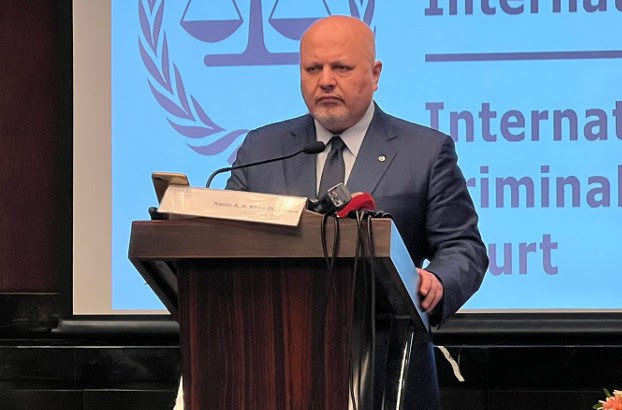By Abdur Rahman and Ahammad Foyez on Jul 07, 2023 Benar News
At least five members of rival Rohingya militant groups were killed in a gunfight Friday at a refugee camp in Bangladesh’s Cox’s Bazar district, police and other sources said.
Separately, following a four-day visit to refugee camps in that southeastern district, International Criminal Court (ICC) Chief Prosecutor Karim A.A. Khan urged the world to provide more humanitarian support because, he said, Rohingya were missing meals after the U.N. World Food Program had cut monthly aid to U.S. $8 from $12 on June 1.
The killings in Friday’s shootout before dawn marked the latest bloodshed between the Arakan Rohingya Salvation Army (ARSA) and Rohingya Solidarity Organization (RSO). Up until relatively recently, Bangladesh officials had denied that Rohingya militants had a foothold in the sprawling refugee camps near the Myanmar border, where security has deteriorated sharply.
“The gunfight that left five dead this morning was between two Rohingya armed groups, ARSA and RSO,” Md. Farooq Ahmed, an assistant superintendent with the Armed Police Battalion, told BenarNews.
Sheikh Mohammad Ali, officer-in-charge of the Ukhia police station, said law enforcers recovered the corpses of those killed in the gunfight, which took place around 5 a.m. at the Balukhali camp.
Camp resident Nur Hafez said gunshots woke him.
“I heard a hue and cry. Rushing to the scene, I found some blood-stained injured people lying on the ground. The police took them away after a while,” he told BenarNews.
“Due to contests among different groups inside the camp, the killings are increasing,” Hafez said.
Syed Ullah, a Rohingya camp leader, said that the feud between the Arakan Rohingya Salvation Army and Rohingya Solidarity Organization had surfaced over efforts to exert dominance in the camps.
“The ordinary Rohingya people have been living in a terrified atmosphere,” he said.
The population of the densely crowded camps has swollen to about 1 million after about 740,000 Rohingya crossed the border into Bangladesh as they fled a brutal military offensive in their home state of Rakhine in Myanmar. That followed a series of deadly attacks by ARSA forces on Burmese military and police posts in Rakhine in August 2017.
Ullah said uncertainty over efforts to repatriate the Rohingya to Myanmar had caused frustration, leading to an increase in criminal activities at the camps.
“We at the camps have faced two-pronged difficulties – our monthly food allocations have been reduced twice and now we face the danger of being killed by the armed groups,” he said.

Karim Khan, the ICC’s chief prosecutor, visited the camps to interview Rohingya about atrocities they suffered before fleeing to Bangladesh.
He had made a similar visit in February 2022 after the Hague-based ICC authorized the investigation in 2019, but that was delayed by the COVID-19 pandemic.
The pre-trial chamber concluded at the time that it was reasonable “to believe that since at least 9 October 2016, members of the Tatmadaw [the Myanmar military], jointly with other security forces and with some participation of local civilians, may have committed coercive acts” against the Rohingya people that constitute crimes against humanity, according to a 55-page court document.
In a separate investigation, the International Court of Justice allowed a case to proceed that the Gambia had brought against Myanmar’s military regime alleging genocide against Rohingya.
The ICJ in May ruled to allow Myanmar officials until Aug. 24 to present arguments and evidence “necessary to respond to the claims” made against them.
Following his four-day visit, Karim Khan expressed concern that Rohingya are going without meals.
“[U]p to March, Rohingya men, women and children were given three meals a day, they were given enough money to eat three times a day. And since March, they have (been) eating twice a day, and not even twice,” he told reporters at the Inter-Continental Hotel in Dhaka hours after flying in from Cox’s Bazar.
Mohammad Alam, a leader of Leda camp in Teknaf, had told BenarNews that the new monthly allocation translates to about 28 taka (25 cents) per day per person or about nine taka (eight cents) per each of three meals a day.
“Is it possible to feed a family with such an allocation,” Alam asked.
During his news conference, Karim Khan, who said he discussed the issue with Prime Minister Sheikh Hasina, expressed similar concerns.
“What could you do with nine taka – I was told one egg is 12 taka,” he said, pointing out that some meals are skipped.
He said children would ask their parents, “‘Where is lunch?’”
“The heart should note that this is an area where the world should give support,” Karim Khan said while urging the World Food Program and other United Nations agencies to step up.
“[I]t is a symptom of a malaise in which we have to show that every human life matters, that we give resources fairly and adequately wherever possible, that we realize 1.1 million people in a camp, the government of Bangladesh also needs support,” he said. “If people are hungry and there is no hope, it will lead to tension and difficulties.”









